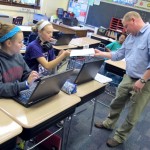Secret Donor List, Now Public, Reveals Powerful Interests Backing Props 1, 2, 3 Fight

Kyle Stokes / StateImpact Indiana
Idahoans will cast their votes to uphold or strike down a controversial package of education reform laws on Election Day.
When financial disclosure reports from Education Voters of Idaho were posted online yesterday, a narrative died. The reports show that 23 contributors gave a total of $641,160 to the group, which is working to uphold the package of controversial education laws known as Students Come First.
More than two-thirds of that $641,160 total came from just two people: Joseph Scott, an Albertsons heir and chairman of the J.A. and Kathryn Albertson Foundation, and New York City Mayor Michael Bloomberg.
Education Voters of Idaho (EVI) has claimed to represent the interest of disenfranchised Idaho parents. “Like most Idahoans, we were tired of education reform getting caught up in politics and being focused on personalities,” reads an opinion piece distributed by EVI founders John Foster and Debbie Field last week.
“We decided to do something about it,” the piece continues, “and founded EVI to push sound policies on behalf of parents and taxpayers throughout the state. Our voices and the voices of thousands of others like us need to be heard.”
David Adler, director of Boise State University’s Andrus Center for Public Policy, says that claim — that Education Voters of Idaho represents thousands of Idaho parents and taxpayers — no longer holds up.
“That narrative falls flat upon disclosure of the significant contributions made by a handful of individuals and organizations both within and beyond Idaho,” Adler says.
Education Voters of Idaho filed its financial disclosure report only after Idaho Secretary of State Ben Ysursa sued for its release last week. A district court judge ruled in Ysursa’s favor on Monday, and the group said Tuesday that it would not contest the ruling.
Like many Idahoans, Adler was anxious to see the names that Education Voters of Idaho had been keen to protect. “I was watching with great interest,” he says. “And so it was interesting, to say the least, that a number of out-of-state contributors were prominent.”
Foster Friess, a Wyoming resident and longtime donor to conservative candidates and causes, contributed $25,000. Money also came from sources in Washington, D.C., Arizona, California, and Oregon. Apart from one small donation — a $100 contribution from Dan Goicoechea, a former chief deputy state controller — the smallest contribution was $1,500.
“Yes for Idaho Education,” has mustered a broader base of support for the Students Come First laws, as demonstrated by the more diverse list of donors included in their financial disclosure reports.
On the other side — the side opposed to the package of education reform laws — the National Education Association and the Idaho Education Association are far and away the largest contributors. That said, the “Vote No on Propositions 1, 2, 3” financial disclosure report includes page after page of donations under $100.
“In democratic politics, we look to see where most of the people stand on these issues,” Adler observes of the donor groups. “Those who donate small sums of money are giving, probably, what they can afford to contribute on an issue of great concern for them. That’s what we look for in politics, as opposed to the idea of having very few organizations and individuals exercise great influence on the outcome.”
The Idaho Legislature passed the Students Come First laws in 2011. The laws do many things, but they are known chiefly as measures that limit teachers’ bargaining rights, institute pay-for-performance, and fund a technological overhaul of Idaho classrooms.
The Students Come First laws will be put to a vote next Tuesday, November 6. They’re addressed on the ballot by the three measures known as Propositions 1, 2, and 3. “Yes” votes will keep the laws in place. “No” votes will repeal them.


